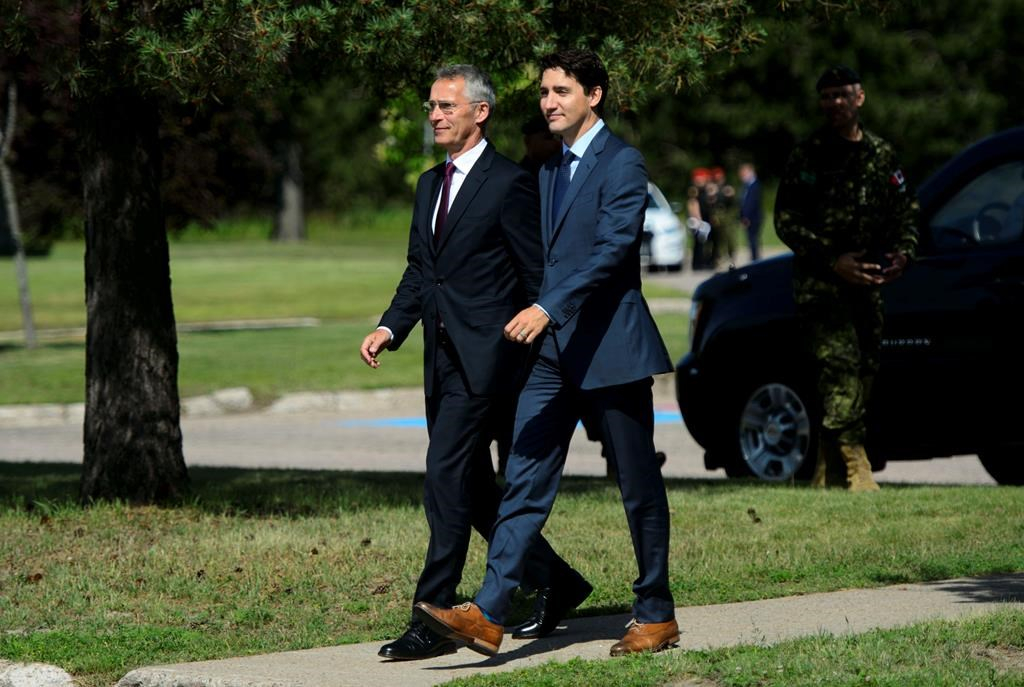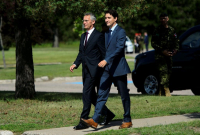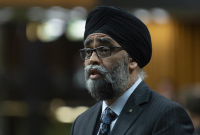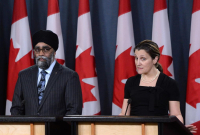Support strong Canadian climate journalism for 2025
Despite President Donald Trump's anti-NATO rhetoric, the "facts on the ground" in Europe show the United States is more supportive of the alliance than before, says NATO's chief.
"We have seen this, not only words, but also in deeds, the United States, together with Canada, is increasing its military presence in Europe after years of reducing major investments in Europe," Secretary-General Jens Stoltenberg said in an exclusive interview Monday on his Canadian visit.
That includes leading a NATO battlegroup in Poland, a counterpart to the Canadian-led mission in Latvia, said Stoltenberg.
"The reality is when you look at the facts on the ground there is no doubt the United States is committed to NATO and European security."
The North Atlantic Treaty Organization was formed in 1949 to provide a collective defence for western Europe and North America against the Soviet Union. Today, Canada would rely on NATO's help in the case of, for instance, a Russian incursion onto Canadian territory in the Arctic.
Trump has called NATO an outdated body, and has complained — as have presidents before him, including Barack Obama — that the U.S. was assuming an oversized financial burden in footing the alliance's bills compared with its European members.
"So President Trump has stated clearly that he wants NATO allies to pay more. He wants fair burden-sharing in the alliance. But at the same time he has also clearly stated that … the United States will continue to be committed to NATO," said Stoltenberg.
The issue of burden-sharing — which among NATO's 29 countries commits how much money to its operations — was front and centre at Monday's meeting at Canadian Forces Base Petawawa, near Ottawa, between Stoltenberg and Prime Minister Justin Trudeau.
The visit started a week of transatlantic diplomacy for Trudeau, who will welcome European Union leaders to a summit in Montreal on Wednesday. The visits are allowing Trudeau to burnish his foreign-policy credentials, which have been battered by the decline in relations with China, and a hard-fought North American trade negotiation that led to a fracture and then a healing with the Trump administration.
Stoltenberg did Trudeau a political favour by praising the increase in defence spending on his watch.
Stoltenberg said "defence spending is now going up" in Canada and other NATO countries after years of reductions, and he urged Trudeau not to backtrack in the face of other threats. He praised Canada's contribution to the NATO mission in Latvia to counter Russian aggression for leading the alliance's training of troops in Iraq.
"After years of decline, we are now in the fifth consecutive year of rise in defence spending across Europe and Canada, and I encourage you to redouble your efforts," Stoltenberg said at a press conference with Trudeau.
The federal government plans to invest billions of dollars less in new military equipment than promised this year, which has raised concerns about whether the Forces will fall short of broader NATO spending targets.
The optics of Monday's visit rankled the Conservatives, who once again urged Trudeau to divulge more details of the Mark Norman case. The fallout from the unsuccessful prosecution of the vice-admiral, formerly the Forces' second-in-command, has caused a revolving door of top military leadership. Four officers have now served as vice-chief of defence staff since Norman was suspended from the office in January 2017 after being charged with breach of trust — a case that has since collapsed. Norman has announced his retirement and signed a legal non-disclosure agreement.
"Today in Petawawa, Justin Trudeau will smile and pose for photo-ops, all while his meddling and political interference has created unprecedented chaos in the Canadian Armed Forces," Conservative Leader Andrew Scheer said in a statement.
"Justin Trudeau needs to use this visit as an opportunity to come clean about his political interference in the Vice-Admiral Mark Norman trial."
Instead, Trudeau and Stoltenberg stood in shirtsleeves in front of an outdoor luncheon for soldiers at the base. Stoltenberg praised them for contributing to a multilateral alliance that is "stronger together," while Trudeau again affirmed Canada's commitment to the rules-based international order.
Trudeau showcased the presence of three female commanders among Canada's foreign missions, including the upcoming deployment of Brig-Gen. Jennie Carignan to lead the NATO Iraq training mission later this year.
Carignan said she hoped her presence in a military leadership role in a male-dominated country would inspire Iraqi women.
There are heightened tensions in the Middle East because of the escalating dispute between the U.S. and neighbouring Iran.
Stoltenberg said in the interview that he was confident Canadian troops could minimize any additional risks. "We therefore will be extremely focused on security, force protection, and I also know the Canadian Forces are professional."
Canada's mission in Latvia is one of several in NATO countries that have borders with Russia, part of a show of force following Russia's 2014 annexation of Ukraine's Crimean Peninsula, and its fomenting of Kremlin-backed Russian separatists in Ukraine's eastern regions.
That makes Canada a target for Russian in this fall's federal election.
"Our best response is to make sure we have a free and independent press," Stoltenberg said, banging his hand on a table.
Russian media outlets, such as the broadcaster RT and Sputnik, which were banned last week from last week's international media-freedom conference in London, are a different category altogether, he noted.
"These are outlets which are funded by the Russian state and they are tools used by Russia."





Comments